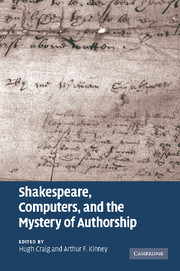Book contents
- Frontmatter
- Contents
- List of figures
- List of tables
- Notes on contributors
- Preface and acknowledgments
- 1 Introduction
- 2 Methods
- 3 The three parts of Henry VI
- 4 Authoring Arden of Faversham
- 5 Edmond Ironside and the question of Shakespearean authorship
- 6 The authorship of The Raigne of Edward the Third
- 7 The authorship of the Hand-D Addition to The Book of Sir Thomas More
- 8 The 1602 Additions to The Spanish Tragedy
- 9 Transforming King Lear
- Conclusion
- Appendix A Plays in the corpus
- Appendix B A list of 200 function words
- Glossary
- Index
- References
1 - Introduction
Published online by Cambridge University Press: 06 January 2010
- Frontmatter
- Contents
- List of figures
- List of tables
- Notes on contributors
- Preface and acknowledgments
- 1 Introduction
- 2 Methods
- 3 The three parts of Henry VI
- 4 Authoring Arden of Faversham
- 5 Edmond Ironside and the question of Shakespearean authorship
- 6 The authorship of The Raigne of Edward the Third
- 7 The authorship of the Hand-D Addition to The Book of Sir Thomas More
- 8 The 1602 Additions to The Spanish Tragedy
- 9 Transforming King Lear
- Conclusion
- Appendix A Plays in the corpus
- Appendix B A list of 200 function words
- Glossary
- Index
- References
Summary
One of the earliest champions of language in Shakespeare's time was Thomas Wilson. In The Arte of Rhetorique (1553) he declares that
Suche force hath the tongue, and such is the power of eloquence and reason, that most men are forced euen to yelde in that, whiche most standeth againste their will. And therfore the Poetes do feyne that Hercules being a man of greate wisdome, had all men lincked together by the eares in a chaine, to draw them and leade them euen as he lusted. For his witte was so greate, his tongue so eloquente, & his experience suche, that no one man was able to withstand his reason, but euerye one was rather driuen to do that whiche he woulde, and to wil that whiche he did, agreeing to his aduise both in word & worke, in all that euer they were able.
Neither can I see that menne coulde haue bene broughte by anye other meanes to lyue together in felowshyppe of life, to mayntayne Cities, to deale trulye, and willyngelye to obeye one another, if menne at the firste hadde not by Art and eloquence perswaded that, which they ful oft found out by reason.
(sigs. A3v–A4r)At the time such ideas were not especially original – the works of Aristotle and Cicero in the Tudor grammar schools had made them commonplace – but Wilson's ambition and vision are nevertheless unusual.
- Type
- Chapter
- Information
- Publisher: Cambridge University PressPrint publication year: 2009
References
- 1
- Cited by

